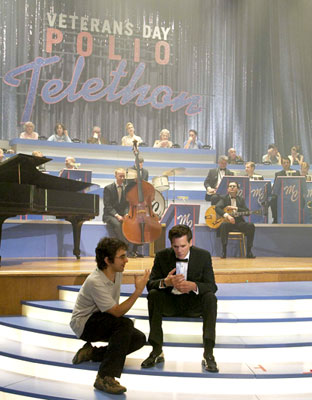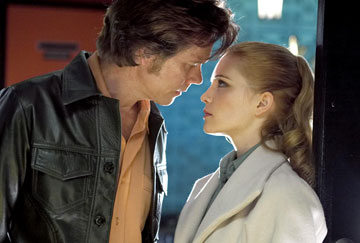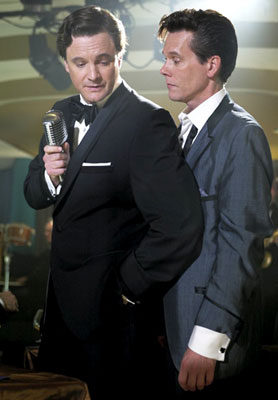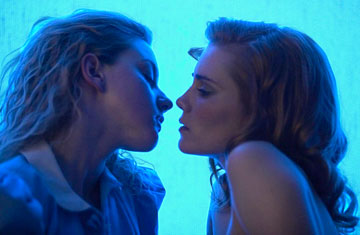ATOM EGOYAN
FINDING THE TRUTH
IN DIRECTING
by Brad Balfour
Copyright ©2005 PopEntertainment.com. All rights reserved.
Posted: October
22, 2005.
For Canadian director
Atom Egoyan creating Where the Truth Lies offered a challenge of
constructing something that was almost a genre film but not quite.
Wrestling with musician/composer Rupert Holmes' novel of the same name,
Egoyan takes a story that plays on the conventions of the classic
comic/singing duo and turns it on its head. Egoyan has been good at doing
that throughout many of his award winning features including Felicity's
Journey, The Sweet Hereafter and Exotica.
Are your characters in
Where the Truth Lies mythic?
Yes, I think that the
very fact that they're on a telethon and a duo, yes, that question will
come up. I think it's also a distracting question because there is
something about the dynamic of any duo, going back to Laurel and Hardy,
Cheech and Chong, Abbott and Costello. We don't have duos anymore. It's
part of our popular culture that has faded away. There was this Freudian
construction about it regarding "ego" and "id". There's always this person
who's impulsive and who has unleashed another character that tries to
civilize them. It's a recurrent theme. I wanted to make [them]
mythological. I wanted to make them an amalgam of many different acts. By
virtue that it's a telethon, people are going to think of Martin and
Lewis. It seems to me that that would be distracting. Given what the drama
is about, for people to think whether or not this might have happened
would be disruptive.
The actors in this film go against their typecasting.
It's also about actors
looking at their own persona and wanting to challenge that. Approaching
Colin Firth in the middle of the Bridget Jones junket, where he's
being idolized as this gentlemanly, D’Arcy-like [as in Jane Austen's hero
in Pride and Prejudice], civilized, [and] polite figure and say,
"Let's kind of shake that up. Let's challenge that." In the case of Kevin
[Bacon], having someone who has a persona and then say, "Let's challenge
that or reconstruct that." Or Alison Lohman, a 26 year-old who's played an
adolescent all of her career. So, [I said], "Let's actually play your own
age. Let's work that persona to try and do something with the alchemy of
the piece that's going to be unexpected." I just think that casting is the
essential thing because very often people are very conservative when it
comes to casting. Many of the actors, who are a certain point, say they
want to challenge themselves, but they really don't. It's great when you
work with people who are excited about arriving on set with a clean slate
and [who try] to build something completely separate.
You never have to worry about Kevin Bacon checking his persona at the
door, because he has had so many.
And to put on, in this
case, brown contact lenses. It's kind of interesting, too, because the
most identifying feature of Kevin are these blue eyes, but it was just
startling to watch him walk on set with this kind of mask — just in the
form of these glass contacts.
 Did
you think of it as a joke when he did the song and dance, especially since
he did a musical like
Footloose?
Did
you think of it as a joke when he did the song and dance, especially since
he did a musical like
Footloose?
Well, he's a performer.
I love the fact that he was able to take that and extend it. It's
something that he has done all year long — he's performing all the time.
Something happened with that act, which was really magical. It was
important to create an act that looked like it could have been around in
the 50's, but that wasn't actually referring to anything that was actually
there. When we were rehearsing, we were playing with the idea that Colin
Firth [was] this proto-English person, based on an amalgam of Noel Coward
and David Niven and all these figures that were floating around in
American culture at that time. Combining that with Kevin [Bacon], it just
became something unto itself. It was remarkable.
Are you attracted to the dark side?
I think my attraction to
the dark side of human behavior comes from this idea of the
responsibilities people have and what happens when they don't take these
responsibilities seriously. It's something that I have observed a lot in
my upbringing and, certainly, the relationship between parents or parent
figures is something that has really marked a lot of the work that I've
done. This story, when I read it, was so incredibly entertaining and fun,
but it's interesting, after you filter it through your own obsessions, it
assumes a tone. Again, it's about our relationship to parental figures -
people who we expect to give us some sort of moral guidance and,
ultimately, aren't up to the task or are not able to maintain a sense of
moral authority. I am also fascinated by characters that are at a point in
their lives when they are emerging from childhood and can assess that and,
maybe, assess change.
Which of your films share these themes the most?
Exotica and
The Sweet Hereafter. In a situation when a child is, again, in a
place where they respect and look up to a parental figure only to find out
that they have been either abused or that they were taken advantage of in
a certain way. They have to, then, respond to that. In this story, you
have a journalist who is doing a story on these two celebrities, but who
has a child [who] adores these two men [and is also] affected by these two
men, and maybe even wants to exonerate them and restore their reputations,
but instead opens up Pandora's Box and realizes that these are very dark
characters. [She] has to re-evaluate and respond. I find that a very
dramatic situation—something that has come up in a number of [my dramatic
films]. I am always fascinated by characters [that] think that they are in
a situation that seems normal but understand or come to an understanding
of how dysfunctional that is and have to respond to it.
Even the villains are victims in your films.
Yes, but, again, [they
are] victims of some sort of order or some something that has been imposed
on them. Maybe, unwittingly, they have accepted that, but it has destroyed
them in some ways.
Did you intend to push the envelope with nudity?
Unwittingly, I pushed
the envelope because I did not expect an NC-17 rating. I just think that
that was a shock. It's an R-rated film, but the MPAA gave it an NC-17, but
appealed and we actually made changes, [which they were insistent on]. I
didn't want to push the envelope that much, but it happened. It's now
unrated, so you're going to see the original version. In terms of the
nudity issue, it's not one of those situations where you can convince
someone of [it being] dramatically essential, but it is. The erotic lives
of these characters are an essential part of the dramatic construction of
the piece. I think that, from the first discussions I had with the actors,
I made that really clear. It's something that they have to feel
comfortable with. I try to make them as comfortable as possible, as
well—there are storyboards and [I tell them] what will be shown and won't
be shown. It's a question of, once the actors know what the parameters
are, it's a dramatic scene like everything else.
 You've
done this before.
You've
done this before.
Yes, I'm aware that,
because the actors are comfortable, it creates an energy which is unusual.
One of the things that drives me crazy in movies, sometimes, is that
you'll see and actress in a situation where they're in a sexual scene and,
suddenly, there is somebody pulling down their skirt or they are covering
themselves up. It just takes you out of the scene completely. It's one of
those things that I can't accept at all.
Or wearing a bra.
Just something which
looks like it’s artificial, or the result of vanity. You just have to be
very clear about where and what a scene has to do and rehearse—make sure
that everybody's comfortable by the time they arrive on set.
Your exploration of eroticism is both dark and titillating.
It's an essential part
of our makeup. If you're exploring your characters with any degree of
scrutiny, given what the subject matter is, I think that it's a place I
need to go to. It's there from the script. I make it very clear what these
scenes entail. I often use language in the script that will also suggest
the tone of what the scene will be so that the actor is prepared — there
are no surprises. That's what I think becomes most threatening to those
types of scenes, when there is something that was introduced when the
actor was not expecting [it].
In terms of the nudity, what were your toughest moments in the movie?
People always ask me if
I get turned on or excited while I'm shooting. Most of the time, you
don't, but then, occasionally, you do. In this case, I know why because
there was this once scene with two women in a very theatrical setting and
it was really inspired by a "Penthouse" fantasy that I had when I was
around 14 or 13. Because of the setting of the film, I felt that part of
it allowed me or gave me license to reconstruct the exact feelings that I
had when I used to watch or look at those magazines. So, that was
interesting. Most of the time, when you're shooting an erotic scene,
there's almost something surgical about it. Then, occasionally,
(laughs) if you set it up in a certain way, and there is a feeling
that is a feeling going on in the set, you can lose yourself there. That's
interesting as well.
How did the actors feel about it?
I think that love-making
and sex [are] very creative [acts] by their very nature. You have to allow
yourself to believe something and you have to transfer yourself into
another place. It's not different from them acting out the scene like
bees. Those lines and the blurred nature of those places [are] always
fascinating to me. The scene that we're talking about is actually about
manipulation. There's a scene when Vince (Colin Firth) constructed a
scene. We find out, the morning after, that it's a completely constructed
scene. That idea of exploitation and the idea of being manipulated is
actually part of the scene itself. So that we could actually go there and
not censor ourselves. Also because we had an observer - this character who
is orchestrating it all, who is watching it unfold, who becomes the
viewer, in a way.
 How "American" is this film?
How "American" is this film?
I think
English-Canadians are always raised with an American TV. I remember waking
up on Sunday morning, looking the tail-end of the telethon, thinking, "My
god! These people were entertaining!" This idea of the monolithic nature
of celebrity. We are not, as Canadians, in a culture that can create
celebrity in the way that [it] happens in America.
So, we have that distance. We are aware of the machinery of that. I think
that this film looks very closely at how these mythologies are constructed
and what might be behind them as well and our relationship to them. You
can look at Karen (Alison Lohman) as proto-Canadian and, in fact, she is.
You have this interesting perspective on it, yet you're able to completely
construct the idea of how appealing and seductive that machinery is.
Do you feel you're more inclined to shoot your films in other countries?
I am sort of a
construction as well. I was an Armenian raised on the west coast of
Canada. We were the only Armenians in a very "WASP" sort of town. So, I
was always aware of being outside of it. English wasn't my first language
and I remember what it meant to actually take on this culture and learn
it, but always being aware of the construction of it and what a culture
meant. All of those things I find very fascinating. When does somebody
have entry into a culture? When do you get that passport? When do you
actually allow yourself to be called a person from this place?
It's somewhat consistent of your films.
Yes. I think that,
again, in a lot of the films, the characters are trying to locate
themselves, in any number of ways. In this case, they are trying to locate
themselves as real people in a world of celebrity, in a world where they
have all of this mythology. So, that becomes the zone [as well as] the
territory.
You seem to be fascinated by deception.
I'm fascinated by people
who adapt persona and slip into other characters. I am fascinated by
professions and jobs that allow you to gain access to other people's lives
in a way that might otherwise be transgressive, but which the job allows
you [to do} - [such as] litigation lawyers, tax auditors, customs
officers, and journalists - people [who] have a badge that allows them to
slip into someone else's life, and maybe there are certain actions that
may be considered neurotically inspired, but within the context of a job,
[they] are acceptable. So, people can slip into personas effortlessly.
What prompted you to do Ararat – which was partially shoot in
Armenia and is a film within a film?
That was an opportunity
for me to deal with a haunting subject for me. A long-time producer friend
of mine said, "Here's an opportunity." It was a very important film for me
to do. It was inspired by an opportunity. It was a harsh subject, dealing
with the subject of genocide that's been denied. I had a producer that was
prepared to back it and I to deal with it because that opportunity was
there. Otherwise, it would have been impossible to make that film.
 What
I like about Where The Truth Lies is that you don't even realize that there's
this next layer of deception.
What
I like about Where The Truth Lies is that you don't even realize that there's
this next layer of deception.
I love mysteries, even
if they're not classically constructed as mysteries. There's that feeling
of being suspended in a place where you're trying to figure out what has
happened. Or you have characters who are trying to put pieces together. In
this case, it's a bit more classical because, actually, you're using more
genre devises. It is noir, in a way. You have these characters that are
floating in this intelligent machine that seems to be toying with their
circumstance. Part of that is also playing with the viewer's own
expectations.
Do you feel that this film is almost like a genre film?
There are aspects of
noir in it. There is a classical murder mystery — it's set up that way. We
see the body at the beginning of the film and we know that there's some
investigation of that. We expect that that's going to pay off, in some
way. So that there is, maybe, a certain formulaic aspect to it which is
different from Exotica, which doesn't conform to any [genre]. The
plot doesn't have to kick in at any place like it does here. I really feel
like in [this film] there are certain narrative expectations that, if you
don't fulfill, will get people very frustrated. So, I think that this film
offers that as well.
What in film history has influenced you to make this film?
This film, more than any
other film, gave me an opportunity to pay homage to a tradition of
filmmaking that has really influenced me. Not only the classic noir, but
also the neo-noir of the films of the 70's, like Body Heat. Also,
the construction of Hollywood glamour, like Gilda or Hitchcock movies. I like
psychological mystery and films that deal with questions of fate and how
characters try to determine that. The whole tradition of noir and Hollywood glamour is
something that has inspired this movie completely. But I also didn't want
this film to be a pastiche. I wanted these influences to be referenced but
not adhered to slavishly - certainly not in a sort of parody.
Are there influences from other fields?
I am hugely influenced
by music; I'm a musician. The other thing about this movie is that, not
only does it access jazz, but also the Mahavishnu Orchestra, Santana,
Funkadelic, going back to Bernard Herrmann and all of these very aggressive
string sections. My influences are as musical as they are cinematic.
Email us Let us know what you think.